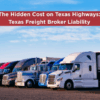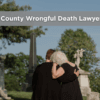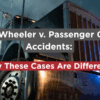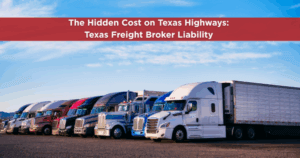
Texas highways see thousands of freight trucks daily—know how freight broker liability impacts road safety and legal responsibility.
It’s just after sunrise on I-35 near Fort Worth when a family’s car is struck head-on by a tractor-trailer that drifts across the median. The 18-wheeler is hauling freight for a large national logistics company. But, the name on the truck’s door belongs to a tiny independent carrier out of the Rio Grande Valley.
Within weeks, the carrier dissolves. The driver, an undocumented immigrant using a borrowed CDL, disappears. When the family’s attorney seeks damages from the freight broker and trailer owner, both are denied liability — claiming they had merely “arranged transportation” through a third-party hauler.
This scenario isn’t unique. It’s the new face of the trucking industry in Texas, where major freight companies increasingly insulate themselves from responsibility through independent contractors, shell carriers, and legal loopholes. And now, a case before the United States Supreme Court may determine whether that system remains untouchable. Or, whether victims finally get a path to justice.
The Case: Montgomery v. Caribe Transport II, LLC
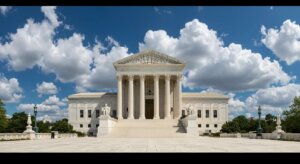
The Supreme Court will soon hear Montgomery v. Caribe Transport II, LLC (Docket No. 24-1238) — a case that could redefine accountability in the U.S. trucking industry. At its core, the case asks:
Can a freight broker or logistics company be held liable under state law for negligently hiring an unsafe or illegal motor carrier? Or, does federal law shield them from all responsibility? This question sits at the intersection of federal deregulation, public safety, and corporate accountability.
The answer could reshape how every trucking-related personal injury case in Texas is litigated.
The Legal Framework: The FAAAA and the “Safety Exception”
The battle revolves around the Federal Aviation Administration Authorization Act (FAAAA), enacted in 1994 to deregulate the trucking and freight industry. The Act prohibits states from enforcing laws “related to a price, route, or service of any motor carrier or broker.” In practice, brokers and large logistics companies have invoked this statute as a liability shield, arguing that state-law tort claims (such as negligent hiring or negligent entrustment) interfere with federal uniformity. But the FAAAA includes an important carve-out: States may still regulate “the safety of motor vehicles.” This is known as the “safety exception.” The question before the Supreme Court is whether that exception allows victims to bring state-law negligence claims against brokers who recklessly choose unsafe or unqualified carriers.
A Split in the Courts
Federal appellate courts have been divided for years:
- The Seventh and Ninth Circuits (covering parts of the Midwest and West Coast) have allowed victims to pursue negligent-hiring claims under the safety exception, recognizing that public safety outweighs deregulation in these cases.
- The Eleventh Circuit (covering the Southeast) — and several Texas federal courts — have held that the FAAAA preempts such claims entirely, leaving victims with no remedy beyond the small carrier that caused the crash.
That conflict between circuits is what brought Montgomery to the Supreme Court.
Texas: The Epicenter of the Freight and Liability Debate

Texas is the beating heart of America’s freight economy and the front line of its liability crisis.
More trucks travel through Texas highways than any other state, and Texas consistently ranks #1 in fatal trucking crashes nationwide. This high traffic volume, combined with proximity to the Mexican border, has created the perfect environment for fragmented, loosely regulated trucking operations:
- Independent contractors and small carriers bid for jobs through national freight-matching platforms.
- Brokers and shippers outsource responsibility through layers of contracts.
- And some carriers employ or subcontract unlicensed or undocumented drivers, often paid in cash, without meaningful oversight.
For accident victims, these complex arrangements create a maze of dead ends.
Independent Trucking and the “Liability Shell Game”

In traditional trucking, a motor carrier owns its trucks, employs its drivers, and carries insurance.
But in today’s fragmented freight world, that structure has eroded. Now, it’s common to see:
- “Lease-on” drivers who operate under another company’s DOT number.
- Shell carriers that exist only on paper to secure loads.
- “Chameleon carriers,” companies that close after an accident and reopen under a new name.
- Freight brokers who claim to be mere intermediaries, even when they exercise control over routes, schedules, or safety.
The result? When a catastrophic crash occurs, the entity with the deep pockets — the broker, shipper, or trailer owner — often says, “Not our truck, not our problem.”
And the victims are left suing a defunct LLC with minimal insurance.
The Border Connection: Immigration and Labor Exploitation
Because Texas is a border state, its trucking industry is deeply tied to cross-border labor and immigration issues.
Investigations by both state and federal agencies have uncovered:
- Drivers operating under fraudulent or borrowed CDLs.
- Companies hiring undocumented immigrants through layered subcontracting chains.
- Fly-by-night carriers that register with fake addresses or falsified insurance.
These aren’t isolated incidents. Many independent operators are pressured into unsafe work, long hours, or driving without proper credentials. While brokers turn a blind eye, prioritizing delivery speed and low rates over safety compliance.
This pattern blurs the line between labor exploitation and public endangerment. And when disaster strikes, the system offers no recourse for victims (or the exploited workers themselves).
How Texas Courts Handle These Cases Today
Under current Texas federal court precedent, most negligent-hiring claims against brokers are dismissed as preempted by the FAAAA.
For example:
- In Hamby v. Wilson (E.D. Tex. 2023), the court found that a broker’s decision to hire a carrier (even one with a poor safety record) was a “service” covered by federal preemption.
- The court rejected the argument that the “safety exception” applied, concluding that Congress intended deregulation to take priority.
Similar rulings in the Southern and Northern Districts of Texas have echoed that reasoning, effectively closing the courthouse doors to victims seeking to hold brokers accountable.
This has left plaintiffs’ lawyers in Texas with limited options: pursue the small carrier’s minimal insurance, or attempt to pierce corporate veils — a difficult and expensive process.
What’s at Stake in the Supreme Court

The decision will likely come by June 2026 and will immediately impact ongoing and future trucking litigation in Texas.
The Human Cost: Victims Without Justice

Every trucking lawyer in Texas has seen it: the victim who did everything right, yet ends up fighting a legal ghost. They sue the driver (who’s judgment-proof). They sue the carrier (which vanishes or files bankruptcy). And when they turn to the broker, they’re told federal law won’t allow it.
For families who’ve lost loved ones, that feels like betrayal by the system itself.
This isn’t just a legal issue; it’s a moral one. When billion-dollar corporations profit from dangerous networks while evading responsibility, the balance of justice tips away from victims and toward impunity.
The Broader Impact on Texas Safety and Commerce
If Montgomery expands broker liability, expect to see a seismic shift in Texas transportation practices:
- More rigorous carrier vetting. Brokers would need to verify licensing, insurance, and driver credentials.
- Better compliance auditing. Shippers and brokers could be held to higher due-diligence standards.
- Fewer shell operations. Increased accountability would discourage “pop-up” carriers used to skirt liability.
- Improved highway safety. Greater responsibility at the top often leads to safer conduct at every level of the supply chain.
But if the Court sides with preemption, Texas may see the opposite — more layers, less transparency, and continued exploitation of both victims and under-the-radar drivers.
Sidebar: How Unlicensed and Undocumented Drivers Slip Through
- Falsified Licensing – Some drivers borrow or buy CDLs from legitimate holders, exploiting weak verification in smaller carriers.
- Shell Companies – A carrier forms under a new DOT number after a crash or inspection failure.
- Broker Blind Spots – Brokers rely on public FMCSA databases but rarely verify insurance or driver identity beyond surface checks.
- Labor Exploitation – Drivers without legal status may work under dangerous conditions with no recourse or benefits.
Each of these loopholes erodes public safety — and each could be curtailed if brokers faced legal accountability.
Voices from Both Sides
Proponents of limiting liability argue that brokers can’t police every carrier and that excessive litigation would cripple the freight economy. Opponents say deregulation has gone too far, allowing corporate actors to outsource risk and undercut safety. In truth, the issue isn’t whether every broker is bad — it’s whether the law should protect those who act irresponsibly at the expense of human life.
A Path Toward Justice
Whatever the Supreme Court decides, Texas attorneys and policymakers must confront an uncomfortable truth: the trucking industry’s growth has outpaced its accountability. Texas families deserve safer highways. Legitimate drivers deserve fair, lawful work. And when tragedy strikes, victims deserve meaningful justice — not excuses rooted in federal loopholes.
HLAW’s Perspective
At Howard Lotspeich Alexander & Williams, PLLC, our team sees beyond the crash report.
We investigate every layer — from the driver’s credentials to the broker’s contracts — to uncover who truly bears responsibility.
Our attorneys have handled cases involving:
- Negligent hiring of unqualified or unsafe carriers.
- Fatal crashes caused by drivers without valid CDLs.
- Brokers and logistics firms attempting to hide behind corporate shells.
We believe accountability shouldn’t stop at the bottom of the supply chain. It should start where the power — and profit — begins.
Conclusion: Justice on the Line
The Supreme Court’s ruling in Montgomery v. Caribe Transport may decide whether Texas victims of trucking accidents can finally pursue the companies that put unsafe drivers on the road — or whether the law will continue to let those companies hide behind paperwork. Either way, one thing is clear: the safety of Texas highways, and the fairness of its justice system, hang in the balance.
Contact HLAW if you or a loved one has been injured in an Trucking Accident
If you or someone you love has been injured in a trucking accident, don’t assume the company behind the truck is beyond reach.
Call Howard Lotspeich Alexander & Williams, PLLC today for a free consultation. Our team will trace every link in the chain — from the driver to the carrier to the broker — and fight for the justice you deserve.
About the Author
Jesse J. Lotspeich is a seasoned trial attorney and partner at Howard Lotspeich Alexander & Williams, PLLC, where he leads the firm’s Personal Injury practice.
Raised in the small West Texas town of Crane, Jesse was instilled early with a strong work ethic and a sense of duty to others. After earning his B.A. cum laude from Howard Payne University and his J.D. from Texas Tech University School of Law, Jesse went to work in Fort Worth. For over 12 years, he worked at the Law Office of James Stanley handling complex accident and injury cases before joining HLAW as a partner.
Jesse specializes exclusively in personal injury litigation, and he carries that focus into every case—whether it’s catastrophic auto or trucking accidents, wrongful death, workplace injuries, or defective products. Known for being a staunch advocate in the courtroom, he personally handles depositions, case investigations, and all trial-level work, never shying from a fight on behalf of his clients.


